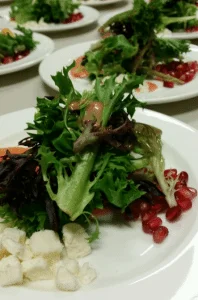The colder months can pose challenges for older adults when it comes to healthy eating when cold weather and dangerous snowy roads can mean less trips to the grocery store for fresh fruits and vegetables. It’s easy to get our required daily dose of fresh produce in the summer when delicious tomatoes and peaches are in season, but it’s equally important to eat fresh in the winter months.
Below are some tips to keep you eating healthy in the winter months:
- Take Advantage of Root Vegetables. Winter is peak season for root vegetables, considered to be some of the most nutrient rich veggies you can eat. Parsnips, yams, beets, and carrots are just some of the root vegetables readily available from fall to spring that are easy to cook and that pack a nutritional punch. Root vegetable are high in vitamins A, B, and C as well iron. Plus, they are high in fiber and slow-burning carbohydrates, so you’ll stay fuller longer after a meal.
- Stock up on Citrus. Oranges, grapefruit, pineapple and all other citrus fruits are in season during the winter months, so you can often find top quality citrus fruits at the best prices. High in vitamin C, citrus is a great addition to winter diets for seniors, to help you keep cold and flus at bay.
- Omega Three Fatty Acids. Next time you visit the grocery store, consider adding walnuts, avocados, and flax seed to your cart. These foods are full of omega three fatty acids, known to reduce inflammation and help curb heart disease, arthritis, and even cancer. Flax seeds can be crushed in a food processor or with a mortar and pestle then added to cereals, yogurt and even salads.
- Include Dark, Leafy Vegetables. The winter months are a great time to add more dark leafy vegetables that are high in vitamins and antioxidants to your diet. Include spinach, broccoli or chard to your meals for extra fiber, and stock up on green veggies by keeping plenty of frozen or canned selections readily available.
- Less Sunlight, More Vitamin D Rich Foods. Our main source of Vitamin D is sunlight. During winter months, nutritionists recommend older adults add more Vitamin D rich foods to their diet, including egg yolks, seafood, healthy grains, and Vitamin D fortified milk.
- Simple Beet, Carrot, Spinach & Quinoa Salad.Looking for winter salad that is nourishing and simple to prepare? This recipe for a beet, carrot, spinach and quinoa salad is full of nutrient rich ingredients to keep you healthy during the colder months. Beets, carrots and spinach are a great source of vitamin A, walnuts are rich in omega fatty acid, and quinoa is high in fiber, magnesium and calcium. Top it with grilled salmon or chicken for extra protein or add goat cheese or feta for a little decadence.


